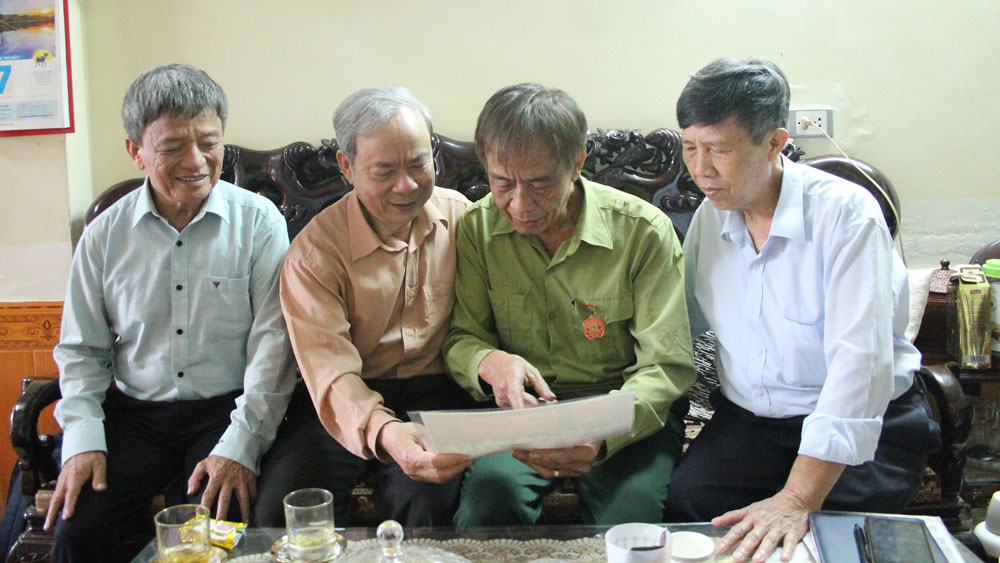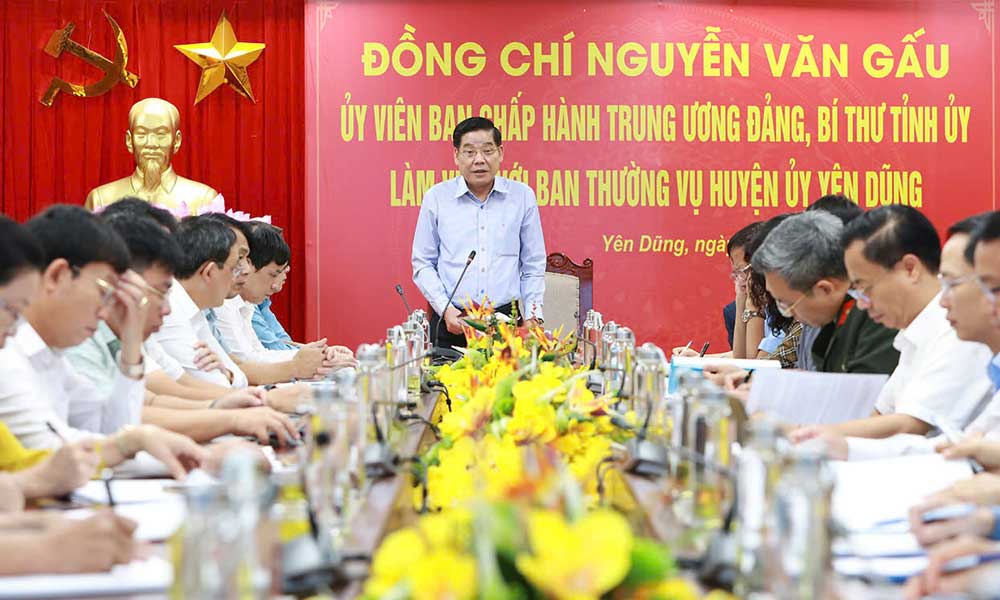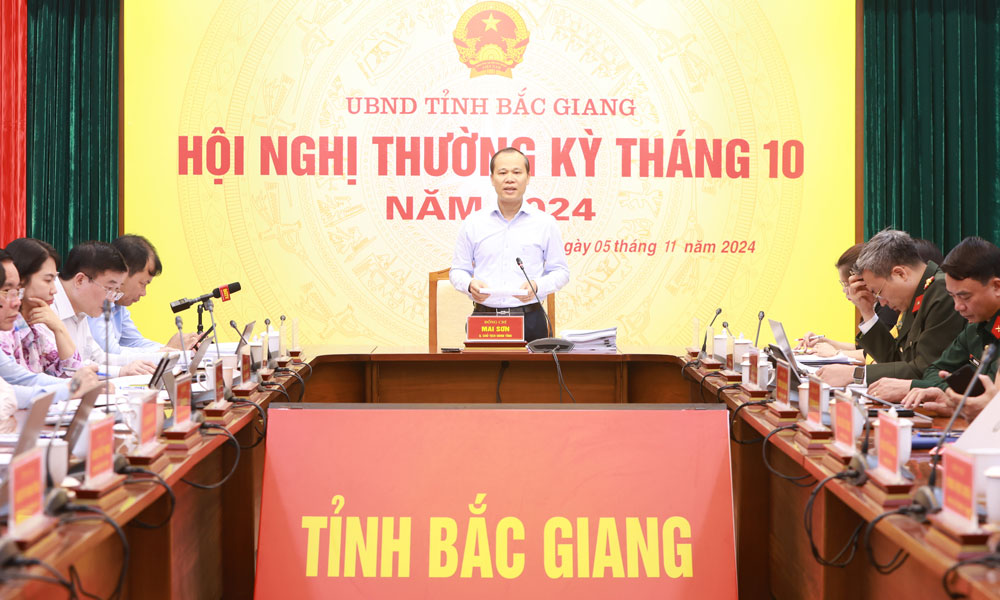Dear comrades who fought in ancient citadel that year!
Being a student at the Hanoi University of Civil Engineering, the 20-year-old man Than Quang Hoat left for the battlefield under the 1971-1972 General Mobilization Order. “I - a young infantry soldier joined the battlefield only after a 3-month training course on new weapons funded by the Soviet Union. During the days I directly participated in the "81 days and nights of Quang Tri Ancient Citadel" campaign, I really did not have full awareness of this event. Only later I just knew that it was one of the fiercest battles in the history of wars in Vietnam,” said veteran Than Quang Hoat, Chairman of Bac Giang city’s association of soldiers fighting in the Quang Tri Ancient Citadel 1972.
 |
|
The veterans fighting in Quang Tri ancient citadel in 1972 review the memories. |
In the moments of quietly remembering the Quang Tri battlefield, veteran Cao Chuc, permanent vice chairman of Bac Giang province’s association of soldiers fighting in the Quang Tri Ancient Citadel 1972, burst into tears. He said that in June 1972, the National Liberation Front launched a campaign to fight the enemy. Our troops were stationed in the East of Thach Han River, where the enemy had a marines battalion. My unit at that time, Special Reconnaissance Company 20 of Regiment 101, Division 325, was assigned the task of studying the terrain and grasping the enemy situation. The political commissar of the unit Cao Chuc was tasked with leading the team.
“At that time, Quang Tri saw the unprecedented heavy rain. Thach Han River water suddenly rose, the command tunnel and the tunnel where our wounded soldiers were hiding were submerged. Many new recruits who were able to swim or were injured could not run, just crawled and then… died. I also did not think I was still alive”.
Among the Bac Giang students who fought in the ancient citadel of Quang Tri were Nguyen Khai and Do Huy Du. Both of them were studying at the Hanoi University of Technology. Khai said: “At school, I just learned some lessons about weapons and did not see any real bullet. When I was tasked to receive new weapons, including airplanes and missiles produced by the Soviet Union, I was extremely worried. But with the commander’s guidance plus the fighting spirit of all students who went to the battlefield that time, I was quite eager”.
On April 1, 1972, our Company 1 shot down the first enemy aircraft. He also remembered the times of crossing Thach Han River. When the soldiers got into the boats and sailed more than half the way, they had to return immediately because they were detected by the enemy. Then in the Long Quang battle, the US-backed Saigon administration’s helicopters dropped bombs, killing more than 40 of his comrades.
Young soldier Vu Van Tuan was an infantry soldier of a transport unit. In 1971, he and a delegation of students from the Hanoi University of Commerce joined an infantry transport unit specialized in carrying ammunition, food, foodstuff and medicine across Ben Hai River to Quang Tri and then transporting wounded and dead soldiers back.
Tuan remembered the battle on September 12, 1972 the most. When he brought ammunition and dry provisions to the soldiers inside the ancient citadel, he was required to stay there. Because he did not belong to a combat unit, he was very tense but could not refuse and quickly integrated into the troops. Amid the danger of being captured by the enemy, he had to disguise and fake his death to avoid the enemy’s detection. Holding his breath to wait for them to go through, he crawled out in the evening and escaped death.
|
War-torn Quang Tri has revived, with a new life seen on both sides of Thach Han River. More than 1,000 members of the association of soldiers of the Quang Tri Ancient Citadel living in Bac Giang province always remember Quang Tri. That deep sentiment is a reminder of each member to live in a way deserving the dedication, sacrifice and loss of their comrades. |
After the reunification of the country on April 30, 1975, the soldiers who had used to be students basically returned to the lecture halls to continue their study. Hoat was sent to a political training course to serve as a military school teacher. Cao Chuc continued joining Corps 2. Before retiring, those soldiers held certain positions in society. Cao Chuc was formerly Secretary of the Party Committee and Chairman of the People's Council of Tan Tien commune (Bac Giang city) for many tenures. Nguyen Khai is former Director of the Bac Giang Department of Industry and Trade. Do Huy Du is former Deputy Director of Bac Giang city’s Urban Project Management Unit; while Than Quang Hoat is former Chief of the Office of the provincial Party Committee's Information and Education Department and Vu Van Tuan is former Director of the Bac Giang Trading Joint Stock Company.
The veterans fighting in the ancient citadel that year have maintained and upheld the virtues of Uncle Ho's soldiers when they return to life right in the beloved Bac Giang hometown.
Thu Phong
 Bắc giang
Bắc giang















Reader's comments (0)